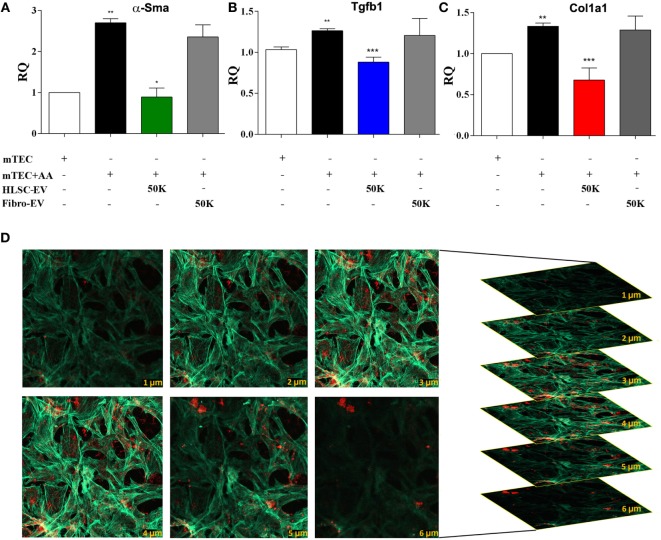Figure 5.
Human liver stem cell-derived extracellular vesicles (HLSC-EVs) downregulate pro-fibrotic genes in mkCF in an in vitro model of aristolochic acid nephropathy. mTECs pre-treated with 100 µM aristolochic acid (AA) for 4 h were cocultured with mouse fibroblasts in the presence or absence of HLSC-EVs or Fibro-EVs (50,000 EVs/cell) for 5 days at 37°C. Post experimental analyses revealed an upregulation of the fibrotic markers: (A) α-sma, (B) Tgfb1, and (C) Col1a1 in mkCF cocultured with AA-treated mTECs (AA). Treatment with HLSC-EVs, but not Fibro-EVs, significantly downregulated all three genes compared to control. The data represent mean ± SEM of three independent experiments performed in quadruplicate. *p < 0.05, **p < 0.01, ***p < 0.001 mTEC + AA vs Control, or HLSC-EVs vs mTEC + AA. No significant differences were observed between mTEC + AA vs Fibro-EVs. A one-way analyses of variance with Bonferroni’s multi comparison test was performed. (D) Representative confocal microscopy depicting the uptake of 1 × 1010 Dil dye-labelled HLSC-EVs by mkCF after 6 h of co-incubation at 37°C. Z stack analyses shows the presence of EVs within the cytoplasm (phalloidin staining, green) of the cells indicating an effective internalisation of vesicles (in red); scale bar = 50 μm. Data represent one of the three experiments performed with similar results.

